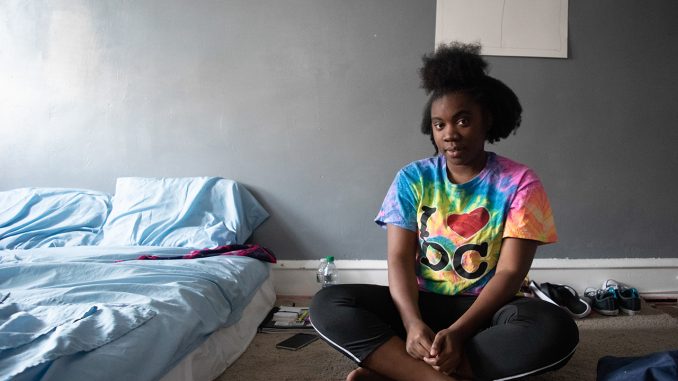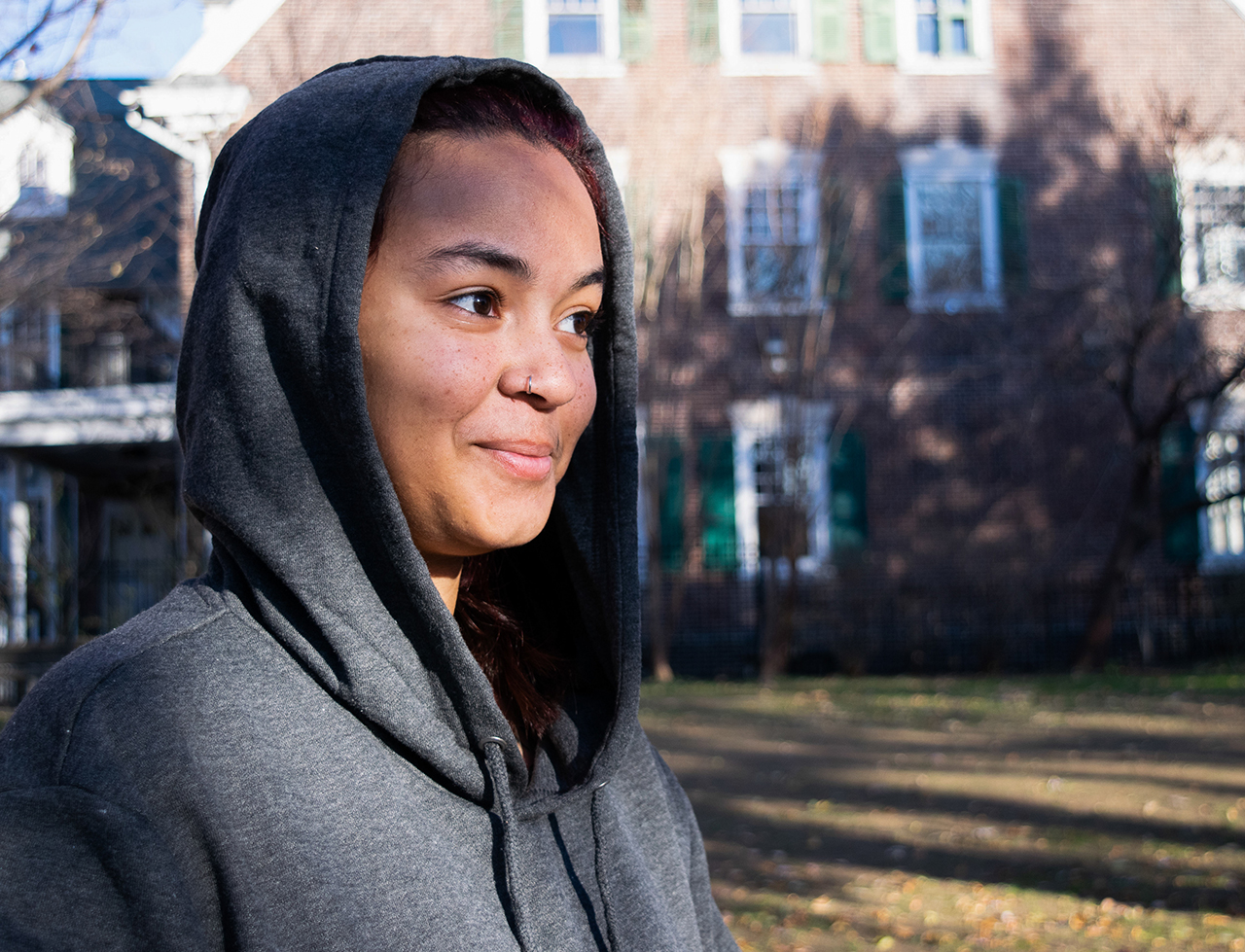
Once she graduates from Temple University, Camellia Brown hopes to enter a fashion-forward marketing firm in Chicago, Los Angeles or New York — wearing a polka dot blazer and saying to herself, “I can do this.” But if her dream job doesn’t present itself, the sophomore public relations major will still find work, she said.
Because she knows how to persevere.
Kicked out of her stepparents’ house in August, Brown is one of 46 percent of college students in the United States to experience housing insecurity in the previous year and among 12 percent to experience homelessness, according to the Hope Center for College, Community, and Justice’s Fall 2019 “#RealCollege Guide to Addressing Basic Needs Insecurity in Higher Education,” the nation’s largest annual assessment of basic needs security among college students.
The assessment defines housing insecurity as moving frequently or being unable to pay rent or utilities and homelessness as not having a permanent place to live, often residing in shelters, cars or on the street.
“My stepfather gave me until the first day of school to move out, and the week after that [my stepmother] talked to me and she said, ‘You have two weeks to move out,’” Brown said. “I basically had to start adulting. That wasn’t my plan until I graduated and had some time and some money saved up, really kind of enjoyed my time in school.”
“She had gone from housing insecure to homeless in a weekend,” said David Brown, diversity advisor at Klein College of Media and Communication.
David Brown became Camellia Brown’s mentor last year after meeting her at “Here are all the Black people,” a conference for advertising and public relations students of color.
His mentorship includes academic advice, like navigating college as a first-generation student, career advice, like succeeding in her former internship with M&T Bank, and personal advice, helping her with anything in between.

In August, mentorship led him to drive his Jeep to Walmart to help transport Camellia Brown’s recently purchased mattress to an affordable apartment in Germantown, and then hauling it up the steep, uncarpeted steps to her rented room.
“She didn’t have a way to get it from Walmart,” David Brown said. “She didn’t ask. It just happened to be like, ‘You know, I ain’t doing nothing today. Let’s go.’”
ADDING UP THE COSTS
The mattress still rests in Camellia Brown’s apartment, which she shares with three men she rarely interacts with.
At $400 a month, her rent less than half the median monthly rate for Philadelphia housing, which was $976 in 2016, according to the Pew Research Center.
Camellia Brown’s job at the Office of the University Registrar pays $200 every two weeks, which she hands directly to her landlord.
“Right now, I only have a dollar to my name,” Camellia Brown said.
On U.S. campuses, costs of room, board and tuition have risen in the last decades, even while costs of consumer goods have plummeted, Business Insider reported last year. From 1994 to 2014, college housing prices rose steadily by about 54 percent at public four-year institutions, according to a 2015 report by HUD.
At Temple, a double-room at Johnson and Hardwick Hall — the university’s cheapest residence hall — costs about $1,020.75 per month for four months, or about one semester.
Freshmen are required to purchase meal plans if they live on campus, with their cheapest option totaling $1,603 for the semester. This equates to an average of $1,421.50 a month for food and housing for freshmen.
Senior Associate Dean of Students Rachael Stark has worked with students experiencing homelessness and housing insecurity, including some who told her they had to stay overnight at the TECH Center, Temple’s only 24-hour building, Stark said.
The “exorbitant costs” of tuition and housing can put a student at risk of housing insecurity, meaning most Temple students who experience it never live in residence halls, Stark said.
“A lot of times, the students who are struggling don’t live with us because that’s not a choice they’re able to make,” she added. “If they were in the halls, that would be awesome because then we know, ‘OK great, you have a safe place to go.’”
LIMITED SHELTER
When Thailee Rivas, a social work student, experienced homelessness her junior year at Temple, she had nowhere to go.
Rivas transferred from Albright College in Fall 2017, a decision her family looked down upon. Initially, she stayed at The Edge Student Village, which she paid for with money from a student loan. She moved home with her mom in Fall 2018, to save money by commuting. But by Spring 2019, Rivas’ family had cut her off from financial support and kicked her out of their home.

Her money drained, so she couch-surfed at friends’ rooms at The Edge while scrambling to find a cheap place to stay. But, her status as a transfer student meant she had fewer friendships and of lesser quality than at Albright, she said. Plus, most on-campus housing units prohibit residents from hosting guests for more than two consecutive nights.
“If I’m coming in three times a week with six backpacks … that’s kind of noticeable,” Rivas said.
She rented a temporary room near Fresh Grocer, a supermarket on Broad and Oxford streets, for three months, but was told she had to leave because she wasn’t a full-time student, she added.
Homeless for the second time in the semester, she looked for 24-hour facilities to rest at night, but indoor shelter on campus was limited. The library only offered 24-hour service during finals weeks, and the TECH Center only offers overnight hours during the workweek.
She resorted to spending nights on wooden benches outside Alter Hall, awakened by security personnel, shaking her and telling her to leave.
“I would just sit up and hold onto my bag,” Rivas said. “After a couple nights of the security continuously like told me I had to move … I’d go down to Penn’s Landing and spend the night around there, wherever the security couldn’t find me, basically.”
So, with three bookbags and a rolling backpack, she meandered through Philadelphia, often encountering other young adults and teens as young as 16 years old in the same situation as her.
“These are children,” Rivas said. “What quality of life do you promise them in the future, when at 16 they’re living on the streets?”
She now rents a room in an apartment in University City, at $366 a month plus $81 in utilities. Like Camellia Brown, Rivas shares the apartment with men she does not know.
She found the apartment through Facebook. Subletting was the only feasible way to afford a room because she was not required to submit a utility payment or last month’s rent, she said.
Rivas feels safer because her boyfriend, who lived with her on the street, also stays in her room, she said. The two are looking for a new place to stay, hopefully around $300 a month, because they are unable to afford December rent, she said. They have yet to find one, but Rivas is hopeful.
“Our motto is, ‘We’ve been through worse and made it out OK,’” she said.
UNRELIABLE AID
Much of Temple’s basic needs aid comes from the Dean of Students office.
Led by Stark, the office can connect students in need to city and university resources. On-campus resources include emergency aid, a food pantry and a free meal-swipe program.
“We really try to take the burden off of the student,” Stark said.
Temporary emergency shelter in the Conwell Inn, a small hotel on Polett and Liacouras walks, can be provided by Temple in extreme situations. This happened in September, when a neighborhood fire displaced students, but was only possible because the university knew the need was short-term, Stark said.
Yet, students experiencing homelessness or housing insecurity without a definite end-date cannot rely on the university for help. State-elected officials are partly to blame for this, as the state government does not offer additional monetary support to help colleges fight homelessness, Stark said.
Other states have passed bills to launch programs addressing homelessness on college campuses. A pilot program in Washington provides students with laundry and shower facilities, housing assistance, case services and food, according to City Lab, a media company. A California bill permits students to sleep in their cars overnight in parking lots.
But in Pennsylvania, “college students aren’t really at the forefront of people’s minds when we’re thinking about homelessness,” said Marissa Meyers, a practitioner researcher at the Hope Center.
“There’s a lot of groups that are focused on young adults in the Philly area, but not necessarily specific to college students,” Meyers added.
Stark plans to apply for a grant by August 2020 that could roll out a form of temporary emergency housing in dorms, she said.
“When students are facing these really challenging circumstances, their community and their friend group really rallies behind them and says, ‘Of course, you can sleep on my couch,’ or ‘Yes, we have an extra bed,’ or whatever the case may be. They are able to find a temporary solution,” Stark said. “Our students are just so resilient.”
STAYING SELF-SUFFICIENT
When they are not in class, working or commuting, Camellia Brown and Rivas are fending for themselves by seeking basic needs assistance and planning for their future.
For Camellia Brown, this involves visiting federal buildings to re-apply for SNAP benefits and food stamps now that she is off her mother’s case. It also means registering with Temple’s Disability Resources and Services, seeking out an academic coach, applying for financial aid, visiting food pantries, finding transportation vouchers and gathering the courage to tell her professors that she is unable to afford textbooks.
“During that week, everything was hitting me,” Camellia Brown said. “I tried to come up to [my professor] and say I wouldn’t be able to afford the textbook. And you know, I started crying.”
A few days later, the professor slipped her a textbook after class once the other students had left.
Rivas had positive interactions with a former middle school teacher, who lent her an interview outfit and helps her grocery shop from time to time, she said. Her professors at Temple offered her little-to-no assistance, she added.
Rivas is not taking classes this semester but has taken courses toward a social work degree. She had attempted to take a leave of absence this semester, but despite complying with an advisor’s guidelines, she was told she missed the deadline, she added.
She and her boyfriend rely entirely on food drives and free services for meals and grocery items.
“We eat as much cheap food as we can get, and make it last long,” Rivas said. “We eat like five-year-olds.”
While studying at Temple, she saw resources like the Student Success Center advertised, but was unaware of the Cherry Pantry or the FAST fund.
“We don’t just need tutors,” Rivas said. “We need a place to live.”
CONTINUING AHEAD
In the coming years, both women want to give back to young adults who are struggling.
“The reason that I got into social work in the first place was because I want to help people,” Rivas said. “Now I want to help people who have housing insecurity, people who are literally on the streets.”
Camellia Brown aspires to start a program for college students experiencing homelessness. She is considering naming the program “We are Here,” and imagines a place for students to share stories, exchange resources and connect to employment opportunities, she said.
“It’s not the end of the world,” she added. “It seems like it right now, but I have a chance to make a difference, and change.”
She smiled, repeating, “I’m still here.”


Be the first to comment